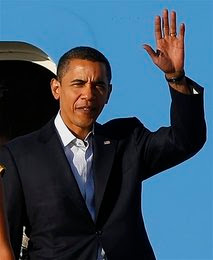
I wonder does this mean he is admitting defeat? How will this affect the poor and middle class?
President Barack Obama's administration signaled on Sunday it is ready to abandon the idea of giving Americans the option of government-run health insurance as part of his ambitious health care proposal.
Facing mounting opposition to the overhaul, administration officials left open the chance for a compromise with Republicans that would include health insurance cooperatives. Such a concession is likely to enrage his liberal supporters but could deliver Obama a much-needed win on a top domestic priority opposed by GOP lawmakers.
Officials from both political parties reached across the aisle in an effort to find compromises on proposals they left behind when they returned to their districts for an August recess.
Obama has been pressing for the government to run a health insurance organization to help cover the nation's almost 50 million uninsured, but Republicans remain steadfast in arguing against it.
Health and Human Services Secretary Kathleen Sebelius said that government alternative to private health insurance is "not the essential element" of the administration's health care overhaul. The White House would be open to co-ops, she said, a sign that Democrats want a compromise so they can declare a victory on the showdown.
"I think there will be a competitor to private insurers," Sebelius said. "That's really the essential part, is you don't turn over the whole new marketplace to private insurance companies and trust them to do the right thing."
Obama's top spokesman refused to say a public option was a make-or-break choice for the administration.
"What I am saying is the bottom line for this for the president is, what we have to have is choice and competition in the insurance market," White House press secretary Robert Gibbs said.
Sen. Kent Conrad, D-N.D., chairman of the Senate's budget committee, pushed the co-op model as an alternative.
"It's not government-run and government-controlled," he said. "It's membership-run and membership-controlled. But it does provide a nonprofit competitor for the for-profit insurance companies, and that's why it has appeal on both sides."
As proposed by Conrad, the co-ops would receive federal startup money, but then would operate independently of the government. They would have to maintain the same financial reserves that private companies are required to keep to handle unexpectedly high claims.
Sen. Richard Shelby, R-Ala., said Obama's team is making a political calculation and embracing the co-op alternative as "a step away from the government takeover of the health care system" that the GOP has pummeled.
"I don't know if it will do everything people want, but we ought to look at it. I think it's a far cry from the original proposals," he said.
Republicans say a public option would have unfair advantages that would drive private insurers out of business. Critics say co-ops would not be genuine public options for health insurance.
Rep. Eddie Bernice Johnson, D-Texas, said it would be difficult to pass any legislation through the Democratic-controlled Congress without the promised public plan.
"We'll have the same number of people uninsured," she said. "If the insurance companies wanted to insure these people now, they'd be insured."
Rep. Tom Price, R-Ga., said the Democrats' option would force individuals from their private plans to a government-run plan, a claim that the nonpartisan Congressional Budget Office supports.
"There is a way to get folks insured without having the government option," he said.
Obama, writing an opinion piece in Sunday's New York Times, said political maneuvers should be excluded from the debate.
"In the coming weeks, the cynics and the naysayers will continue to exploit fear and concerns for political gain," he wrote. "But for all the scare tactics out there, what's truly scary — truly risky — is the prospect of doing nothing."
Congress' proposals, however, seemed likely to strike end-of-life counseling sessions. Former Alaska Gov. Sarah Palin has called the session "death panels," a label that has drawn rebuke from her fellow Republicans as well as Democrats.
Sen. Orrin Hatch, R-Utah, declined to criticize Palin's comments and said Obama wants to create a government-run panel to advise what types of care would be available to citizens.
"In all honesty, I don't want a bunch of nameless, faceless bureaucrats setting health care for my aged citizens in Utah," Hatch said.
Sebelius said the end-of-life proposal was likely to be dropped from the final bill.
"We wanted to make sure doctors were reimbursed for that very important consultation if family members chose to make it, and instead it's been turned into this scare tactic and probably will be off the table," she said.
No comments:
Post a Comment